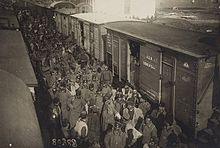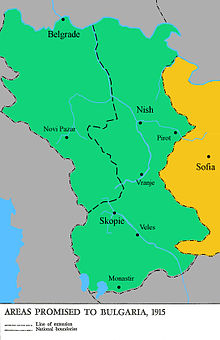|
Here Comes a New Challenger |
- By TomStar81
Following the failure of the Gallipoli Campaign in September of 1915, a nominally neutral nation made a critical decision that would result in a combat flareup in the Mediterranean region in October 1915. For some months, the Kingdom of Bulgaria had been on the fence about whether it would be pro-Allied or pro-Central in World War I. In September of 1915, as the Imperial German and Imperial Ottoman forces gained ground and stopped the invading Imperial Russian and British Empire forces, respectively, Vasil Radoslavov signed the Treaty for friendship and alliance between Bulgaria and Germany. In so doing, Bulgaria aligned itself with the Central Powers and prepared to enter the war in order to acquire territory that the Bulgarian public believed had been occupied by Serbia as a result of the Second Balkan War in 1913.
This was not the first time that invasion, occupation, or conquest of Serbia had been proposed. Earlier in 1915, German Chief of the General Staff Erich von Falkenhayn tried to convince the Austro-Hungarian Chief of Staff, Conrad von Hötzendorf, of the importance of conquering Serbia. If Serbia were taken, then the Germans would have a rail link from Germany, through Austria-Hungary and down to Istanbul (and beyond). This would allow the Germans to send military supplies and even troops to help the Ottoman Empire. While this was hardly in Austria-Hungary's interests, the Austro-Hungarians did want to defeat Serbia. However, Russia was the more dangerous enemy, and furthermore, with the entry of Italy into the war on the Allied side, the Austro-Hungarians had their hands full.

In a series of documents signed ahead of the Bulgarian-German treaty, the Central Powers and Bulgaria drew up detailed plans for the final defeat and conquest of Serbia. Germany and Austria-Hungary were obliged to act against Serbia within thirty days of the signing of the convention, while Bulgaria had to do the same within 35 days of that date. Germany and Austria-Hungary were to field at least six infantry divisions for the attack, and Bulgaria at least four infantry divisions that were significantly larger than those of the Germans and Austrians. All these forces were to be placed under the command of Generalfeldmarschall August von Mackensen, who was "to fight the Serbian Army wherever he finds it and to open and insure as soon as possible a land connection between Hungary and Bulgaria". Germany also pledged to assist with whatever war material Bulgaria needed unless it harmed Germany's own needs. Bulgaria was to mobilize the 4 divisions within 15 days of the signing of the convention and furnish at least one more division (outside of Mackensen's command and forces) that was to occupy Vardar Macedonia. Bulgaria also pledged to keep strict neutrality with Greece and Romania for the duration of the war operations against Serbia, as long as the two countries remained neutral themselves. The Ottoman Empire was given the right to adhere to all points of the military convention and von Falkenhayn was to open immediate negotiations with its representatives. For its part, Bulgaria agreed to give full passage to all materials and soldiers sent from Germany and Austria-Hungary to the Ottoman Empire, as soon as a connection through Serbia, the Danube or Romania had been opened.

On the same day, Bulgaria and the Ottoman Empire concluded a separate agreement that granted Bulgaria the possession of the remaining Ottoman lands west of the river Maritsa including a 2-kilometer stretch on its eastern bank that ran along the entire length of the river. This placed the railway to the Aegean port of Dedeagach and some 2,587 square kilometers (999 square miles) under Bulgarian control.
The Allies were unaware of the treaty between Bulgaria and Germany and on September 13 made a new attempt to gain Bulgarian support by offering the occupation of the uncontested zone by Allied troops as a guarantee that Bulgaria would receive it after it had attacked the Ottoman Empire. This offer was seen as a sign of desperation by the Allied powers, and even the British foreign minister considered it inadequate. Radoslavov decided to play along and asked for further clarification. In Bulgaria, the mobilization order went out on September 22, with the country officially committing to war in October.
Bulgaria's entry into World War I resulted in two major events in October 1915. The first was the reopening of the Serbian Campaign, which would see Allied and Central-aligned nations clash in the region repeatedly for the remainder of the war. In October alone, the actions of the Central Powers and Bulgaria resulted in the Morava Offensive, the Ovče Pole Offensive, the Battle of Krivolak, the opening of the Macedonian Front, and a renewed round of brutal fighting in the Balkans Campaign. Bulgaria's entry into the war as a Central Power also had major political ramifications: during that month, the United Kingdom, French Third Republic, Kingdom of Italy, and Russian Empire all declared war against Bulgaria, and British, French, and Italian forces were deployed in Serbia's defense.
|
|
Here Comes a New Challenger |
- By TomStar81
Following the failure of the Gallipoli Campaign in September of 1915, a nominally neutral nation made a critical decision that would result in a combat flareup in the Mediterranean region in October 1915. For some months, the Kingdom of Bulgaria had been on the fence about whether it would be pro-Allied or pro-Central in World War I. In September of 1915, as the Imperial German and Imperial Ottoman forces gained ground and stopped the invading Imperial Russian and British Empire forces, respectively, Vasil Radoslavov signed the Treaty for friendship and alliance between Bulgaria and Germany. In so doing, Bulgaria aligned itself with the Central Powers and prepared to enter the war in order to acquire territory that the Bulgarian public believed had been occupied by Serbia as a result of the Second Balkan War in 1913.
This was not the first time that invasion, occupation, or conquest of Serbia had been proposed. Earlier in 1915, German Chief of the General Staff Erich von Falkenhayn tried to convince the Austro-Hungarian Chief of Staff, Conrad von Hötzendorf, of the importance of conquering Serbia. If Serbia were taken, then the Germans would have a rail link from Germany, through Austria-Hungary and down to Istanbul (and beyond). This would allow the Germans to send military supplies and even troops to help the Ottoman Empire. While this was hardly in Austria-Hungary's interests, the Austro-Hungarians did want to defeat Serbia. However, Russia was the more dangerous enemy, and furthermore, with the entry of Italy into the war on the Allied side, the Austro-Hungarians had their hands full.

In a series of documents signed ahead of the Bulgarian-German treaty, the Central Powers and Bulgaria drew up detailed plans for the final defeat and conquest of Serbia. Germany and Austria-Hungary were obliged to act against Serbia within thirty days of the signing of the convention, while Bulgaria had to do the same within 35 days of that date. Germany and Austria-Hungary were to field at least six infantry divisions for the attack, and Bulgaria at least four infantry divisions that were significantly larger than those of the Germans and Austrians. All these forces were to be placed under the command of Generalfeldmarschall August von Mackensen, who was "to fight the Serbian Army wherever he finds it and to open and insure as soon as possible a land connection between Hungary and Bulgaria". Germany also pledged to assist with whatever war material Bulgaria needed unless it harmed Germany's own needs. Bulgaria was to mobilize the 4 divisions within 15 days of the signing of the convention and furnish at least one more division (outside of Mackensen's command and forces) that was to occupy Vardar Macedonia. Bulgaria also pledged to keep strict neutrality with Greece and Romania for the duration of the war operations against Serbia, as long as the two countries remained neutral themselves. The Ottoman Empire was given the right to adhere to all points of the military convention and von Falkenhayn was to open immediate negotiations with its representatives. For its part, Bulgaria agreed to give full passage to all materials and soldiers sent from Germany and Austria-Hungary to the Ottoman Empire, as soon as a connection through Serbia, the Danube or Romania had been opened.

On the same day, Bulgaria and the Ottoman Empire concluded a separate agreement that granted Bulgaria the possession of the remaining Ottoman lands west of the river Maritsa including a 2-kilometer stretch on its eastern bank that ran along the entire length of the river. This placed the railway to the Aegean port of Dedeagach and some 2,587 square kilometers (999 square miles) under Bulgarian control.
The Allies were unaware of the treaty between Bulgaria and Germany and on September 13 made a new attempt to gain Bulgarian support by offering the occupation of the uncontested zone by Allied troops as a guarantee that Bulgaria would receive it after it had attacked the Ottoman Empire. This offer was seen as a sign of desperation by the Allied powers, and even the British foreign minister considered it inadequate. Radoslavov decided to play along and asked for further clarification. In Bulgaria, the mobilization order went out on September 22, with the country officially committing to war in October.
Bulgaria's entry into World War I resulted in two major events in October 1915. The first was the reopening of the Serbian Campaign, which would see Allied and Central-aligned nations clash in the region repeatedly for the remainder of the war. In October alone, the actions of the Central Powers and Bulgaria resulted in the Morava Offensive, the Ovče Pole Offensive, the Battle of Krivolak, the opening of the Macedonian Front, and a renewed round of brutal fighting in the Balkans Campaign. Bulgaria's entry into the war as a Central Power also had major political ramifications: during that month, the United Kingdom, French Third Republic, Kingdom of Italy, and Russian Empire all declared war against Bulgaria, and British, French, and Italian forces were deployed in Serbia's defense.
|

